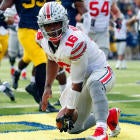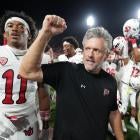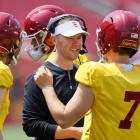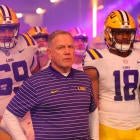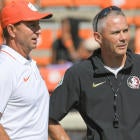CHICAGO -- J.T. Barrett hated football. Not only that, he's willing to describe his loathing in detail.
"Let's talk about camp, freshman year," Ohio State's redshirt junior quarterback said.
OK, let's.
They came to his room at 5 a.m. for two-a-days wake-up call. Barrett, a four-star early enrollee from Texas, would stare at the ceiling and wonder what he got himself into.
"Man, do I love football?" he asked himself. "At the time I told myself, not really."
But hate? That's a strong word, especially for a former Big Ten quarterback of the year who finished fifth in voting for the 2014 Heisman Trophy.
But you never forget your freshman year, and Barrett's in 2013 was apparently a bitch.
"Because it's hard, because you're always getting yelled at," he said Tuesday at Big Ten Media Days. "I don't know if [former offensive coordinator Tom Herman] even knew my name.
"It's not something that you adjust to easy, I guess. I can still remember my freshman year. I didn't like going to the Woody and that was to practice."
That Woody Hayes Athletic Center practice facility is now the foundation for something altogether different in Urban Meyer's fifth season.
It doesn't make sense, really. The Buckeyes have lost 16 starters from a 12-1 team. Twelve players were drafted, all in the first four rounds. Over half the scholarship players remaining (44) have never played a game.
No one blinked, though, when the Buckeyes were picked to win the Big Ten. Not Michigan, riding high on Harbaugh Hype. Not Michigan State, the actual defending champions.
The media picked Ohio State, warts and all.
Apparently the oldest of football adage still applies: If you have a quarterback, you have a chance.
That chance is a 6-foot-2, 225-pound bundle of -- at times -- contradiction. Barrett is a team captain who has been arrested for DUI. A talent so obscure, Meyer once called him "J.T. Barnett." A decided backup who saved the Buckeyes' bacon two years ago in that national championship season.
A leader now with all the trimmings who doesn't want to hear excuses.
"I don't think that the expectations are lower this year," Barrett said. "I don't think that's fair to the people who came through Ohio State before, not only for the legends but the fans.
"Do you want us to tell the fans, 'Yeah, we lost some guys. I don't know about that Big Ten championship.' They'd look at you crazy."
Barrett is a descendant from Meyer's dual-threat quarterback tree that includes an 11-year NFL veteran (Alex Smith), a Heisman winner and two-time national champion (Tim Tebow), Braxton Miller and Cardale Jones.
Barrett replaced the injured Miller in 2014 and lost the starting job to Jones in 2015. He has been injured, discouraged and -- as we now know -- just not into football.
Barrett arrived that first year with cornerback Eli Apple, the No. 10 overall pick in this year's NFL Draft.
"We were in the dorms talking about how awful it is at Ohio State," Barrett said. "It was rough for young guys. You start back over. You got to a place like Ohio State, it's not easy."
By 2015, Barrett had a hand in a Big Ten title and a national championship. But he did not play in either game because of a season-ending ankle injury against Michigan in 2014.
By 2015, he'd also lost the starting job.
"I told Cardale, 'You're better than me,'" Barrett admitted. "'You deserve to play.'"
"It wasn't J.T.'s team," Meyer said. "He's more than ready to go now."
So much so that Barrett demands that rookies pay the price just like he did -- even if it's little things. Barrett decided not to call freshman offensive lineman Michael Jordan by his name because he hadn't "earned" it yet.
"If someone comes in as Michael Jordan," Barrett said, "I got to see what you got before I call you by your name."
Assertion used to be an issue. Even with Barrett now a veteran, reporters have to lean in to hear his answers. He is a classic low talker.
How, it was asked, did he command a huddle?
"We don't huddle," Barrett said.
Touche and bravo for the zone-read spread.
Barrett got over hating football, but he disliked what Ohio State had become last season. He eventually won the job back from Jones but sometimes just winning wasn't enough.
"There were times when we won the game and we didn't enjoy it ...," he said. "We were hard on ourselves. At times we should have lightened up a little bit.
"There were times we should have beaten teams by 30. But we didn't. I was figuring out why that didn't happen."
The number of teams that have that "problem" can be written on a gum wrapper. That's why it should be noted this is not your typical loss-of-16-starters team. There are two players on the defensive line, Sam Hubbard and Tyquan Lewis, who each had more sacks than No. 3 overall pick Joey Bosa.
Freshman Mike Weber is expected to approximate what Ezekiel Elliott accomplished at tailback. Those expectations are through the roof for a team that needs to be reshaped, if not rebuilt.
That's where a grown-up J.T. Barrett comes in. The 64 percent career passer is the latest iteration of the great Meyer dual-threats who have ruled the landscape since Smith at Utah in 2005.
You get the feeling that if everything else breaks down, Meyer would put the entire offense -- maybe the entire team -- on the back of the kid who once hated football at Ohio State.
He's done it before. Since Tebow's Heisman season in 2007, Meyer's starting quarterbacks have rushed more than 1,200 times -- an average of 157 carries per season.
The latest comes with admitted issues on the field. Barrett went into great detail Tuesday about being too cerebral.
"I would be thinking in the middle of a play," he said. "We're playing at Michigan State in 2014. I ran a counter to left, Zeke [Elliott] chops a guy. I step through a tackle. I run down the sideline.
"I remember thinking, 'Should I step out of bounds? Well, we're up. We want the clock to run.' ... I was definitely doing some bad thinking."
Too much information? Barrett is the back-end success of a process Meyer has seen a million times. Ohio State's coach has spoken often of having to reprogram entitled recruits.
"You have to embrace the grind," Meyer said. "There are plenty of places to go [play]. I hear the word 'chill.' You'll never hear that at our place."
The lingering question is not only what Barrett was at Ohio State, it's what he can be.
"You're judged on your past," he concluded, "but you don't hang your hat on it."












